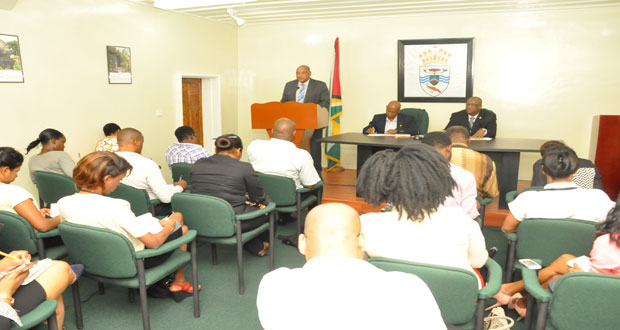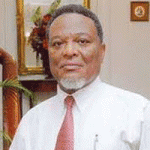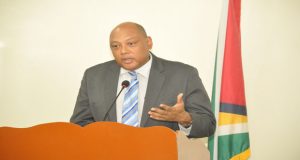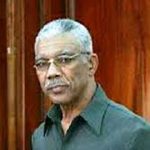
President Granger assents to bills passed in National Assembly – Jagdeo’s benefits capped, anti-money laundering regime in effect
PRESIDENT David Granger has assented to three bills recently approved by the National Assembly in the 11th Parliament, where the Opposition People’s Progressive Party (PPP) is yet to make an appearance.Minister of Governance, Raphael Trotman disclosed to the press corps yesterday during the post-cabinet briefing at the Ministry of the Presidency, Shiv Chanderpal Drive, that President Granger
had assented to the bills before his departure on Saturday morning for the United Nations Third International Conference on Financing for Development in Ethiopia. Those bills, which will now become law after they have been gazetted, are the Former Presidents (Benefits and other Facilities) Bill, Constitution (Amendment) Bill, and the Anti-Money Laundering and Countering the Financing of Terrorism (Amendment) Bill.
FINANCIAL EXTRAVAGANCE EXPOSED The impetus of the Former Presidents’ amendments was brought to light when Finance Minister, Winston Jordan in the National Assembly last Thursday made disclosures of financial extravagance, on what he called the “outrageous” and “scandalous” benefits accrued by former President Bharrat Jagdeo since demitting office in 2009. Jordan recounted that the benefits of the former President were tax-exempt, and even as a sitting President in Guyana received a monthly salary of $1.6M, and a former President is entitled to 7/8 of that salary upon demitting office. This amounts to a monthly salary of $1.4M. The 2009 Former Presidents Benefits legislation enacted by former President Jagdeo as he was preparing to demit office after serving two terms was described as extravagant, considering the millions of dollars expended on former President Jagdeo for travel, utilities, security and staff.
NOT RETROACTIVE There is a common perception that the law is not retroactive and therefore would not affect former Presidents who served before the amendments were enacted. “We have no intention of going back to reclaim or to recover or to recoup anything that is passed,” Minister Trotman said in response to this question, “but going forward, the Minister of Finance will be guided by the legislation that has been assented to by the President.”
CAPS When asked whether the amendments to the Former Presidents’ bill will affect benefits of former President Jagdeo, Trotman responded, “That was the expectation and the intention of the National Assembly and Parliament when it was assented to, but we can’t go back to recover that which already has been spent, but there will be caps.” Constitution (Amendment) Bill The most contentious of the three bills has been the Constitution Amendment Bill, which will grant financial independence to constitutional agencies, giving those bodies the power to draw directly from the Consolidated Fund, without direction from the Government. Financial autonomy under the imminent legislation will affect the operations of constitutional agencies like the Chambers of the Director of Public Prosecutions (DPP), Office of the Ombudsman, Guyana Elections Commission (GECOM), Public Procurement Commission, and the Judicial, Public, Police and Teaching Service Commissions. The A Partnership for National Unity+ Alliance For Change (APNU+AFC) coalition Government in the National Assembly is convinced that while there are clauses in Guyana’s Constitution which must receive a two-third majority vote in the National Assembly in order to be amended, Article 222A is not one of those clauses.
Former Attorney General, Anil Nandlall has expressed openly via his Facebook page, and even in the media by way of letter, that he will be challenging the law before the courts when the PPP takes up its seat in the National Assembly. “This bill seeks to amend the Third Schedule of Article 222A of the Constitution by adding certain entities to the said schedule,” Nandlall noted in a recent letter published by this publication, citing the “many implications which [will] arise from this.” “It is more commonsense and logic than law, that the schedule to an article in the constitution is part of that article,” the former AG said. “The Third Schedule is part of Article 222A,” Nandlall’s letter read. If the former Attorney General is correct then the provision, amended by the APNU+AFC Government in the National Assembly, must require a two-thirds majority. At the post-cabinet briefing, the Governance Minister was questioned whether Attorney General Basil Williams had advised Cabinet on the impending challenge to the legislation.
“We will not enact laws that we are not prepared to defend,” Trotman responded, adding that the former Attorney General is entitled to an opinion but “we have been duly and properly advised by the Honourable Attorney General and by eminent Senior Counsel that we are on the right legal standing.”

Former Prime Minister Samuel Hinds, who served briefly as President following the death of former President Dr. Cheddi Jagan in 1997
AML/CFT LEGISLATION Guyana will soon come under review by the Financial Action Task Force (FATF) in October, but the country, unlike its previous reviews, will be equipped with the requisite AML/CFT legislation. “There are some regulations which accompany that act,” Minister Trotman disclosed after noting the President’s assent to the long-awaited legislation “We are in the process of reviewing them and inviting stakeholders to review and comment before we take them forward,” he continued.
By Derwayne Wills




